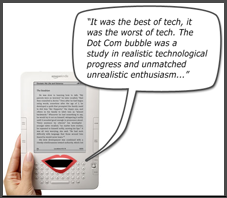 In this New York Times op-ed column, Authors Guild president Roy Blount, questions whether the Kindle 2 takes away revenue from writers for spoken versions of their work. The problem? The Kindle 2 is able to read aloud downloaded text without any extra payment to the authors–something, Blount claims, they get today when someone purchases an audio version of a book.
In this New York Times op-ed column, Authors Guild president Roy Blount, questions whether the Kindle 2 takes away revenue from writers for spoken versions of their work. The problem? The Kindle 2 is able to read aloud downloaded text without any extra payment to the authors–something, Blount claims, they get today when someone purchases an audio version of a book.
I don’t buy this whole problem. It sounds like a classic argument of an established business model feeling the squeeze of impending innovation. I buy a book; I buy a Kindle; I read the book on the Kindle; I listen to the book on the Kindle. All fine by me. Adjust and get over it.
But, hey, I understand. He’s concerned about losing money. I get that.
Anyway, I started thinking more about what it means to read a book aloud and a couple thought experiments led me to this post.
For instance, you might first argue that a book reading capable device shouldn’t have to pay anything to the author–in large part because the quality doesn’t match the quality of let’s say an audio version of a book spoken by an actor or the author himself. (My disagreement is more fundamental, but for argument sake let me go along with them.)
So I wondered: What would it be like if a Kindle 10 device had a system whereby the synthesized speaker was even more realistic. What then? For example, suppose that the synthesizer took actual captured sequences from the author themself and using meta data about the book content and the author’s speaker style so that it could synthesize a version of the Kindle spoken book that pretty much matched the studio recorded version themselves. Whether the synthesized version and the recorded version are indistinguishable is not the issue. The argument, some propose, would be around whether the quality of the synthesized version is so good and compelling that it disuades someone from buying the audio version and thereby author never gets their audio version rights.
Actually, I think at this point, there probably are rights that they could claim. I’d go along with someone claiming digital rights, not for the rendition of the synthetic author speaking, but rather, for access to the author’s digitized representation and meta data. That’s where the value would be and the potential revenue. Readers would pay let’s say $10 extra to have the digitized persona of say Tom Clancy read his latest novel to them.
Now you might argue that these digital personas wouldn’t give them the same amount of revenue. That might be true. Someone might only buy “Robert Scoble’s” speaking patterns once and use it more than one time to read different books or blog posts he’s written. However, more likely, as the author creates more and different content and techniques for improving the content become available (such as better meta data or newer algorithms that the meta data may leverage), then you can envision these augmented-slash-customized personas being sold for each title or as incremental chunks over time.
In other words, given such a system I see future revenue for the authors. Now, if there are “generic” or special speakers that people want to use instead, well, then the author loses out in my mind, but hey, that just means the authors not only need to create value for their written versions and their audible versions. That makes sense to me.
Now who knows if the technology I outline here becomes doable or practical, but my point is that I can perceive at least one scenario where authors still can get paid for their content or “work” even with devices like Kindle with speech synthesizers.
